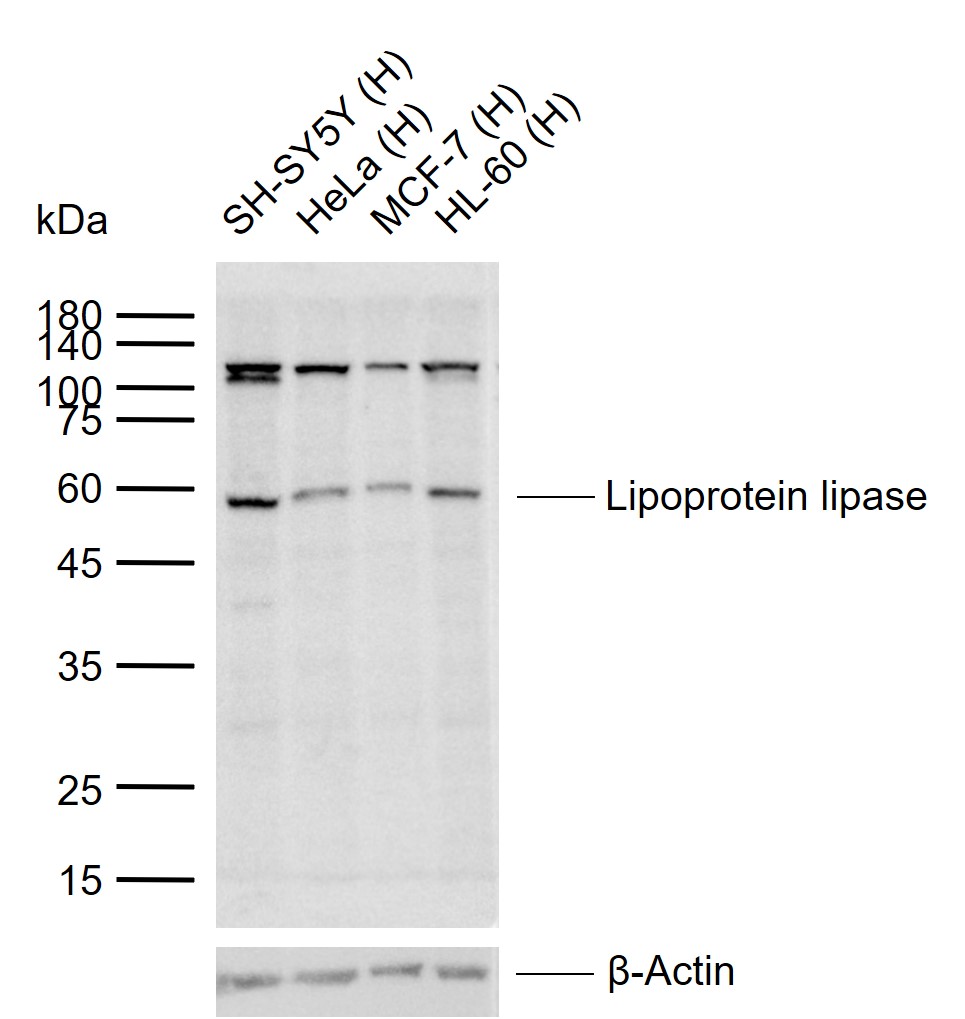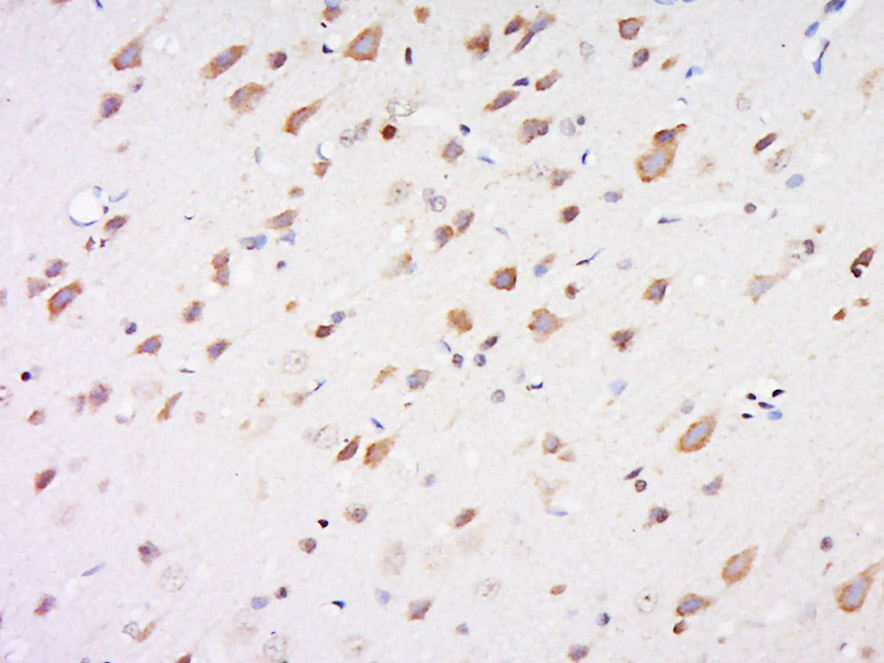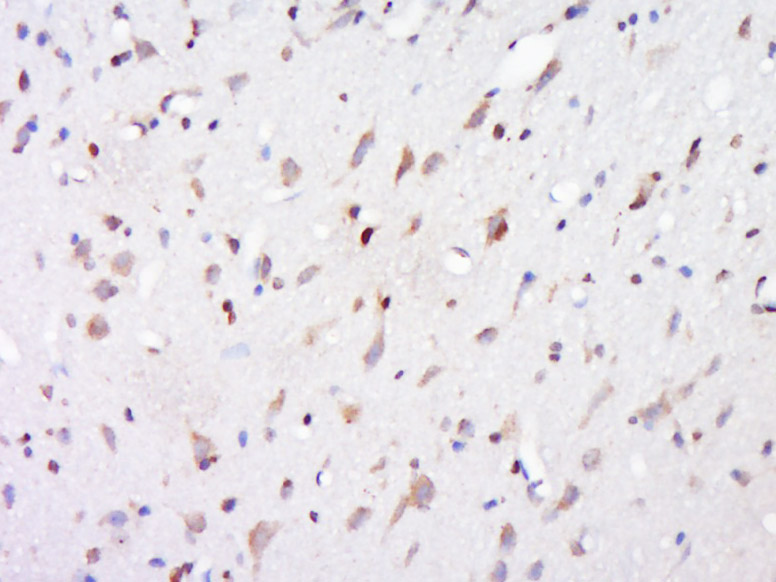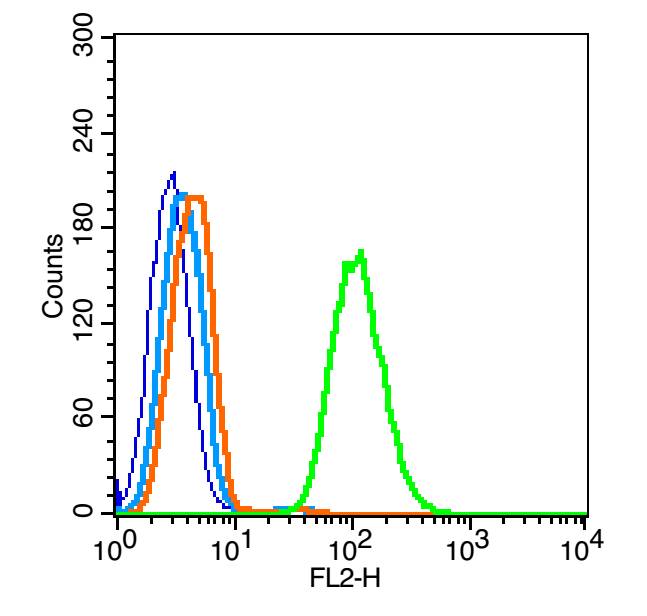
Rabbit Anti-Lipoprotein lipase antibody
Lipoprotein lipase; LIPD; LIPL_HUMAN; LPL; LPL protein; EC 3.1.1; EC 3.1.1.34; HDLCQ11; LPL; LPL protein; MGC137861.
View History [Clear]
Details
Product Name Lipoprotein lipase Chinese Name Lipoprotein脂酶抗体 Alias Lipoprotein lipase; LIPD; LIPL_HUMAN; LPL; LPL protein; EC 3.1.1; EC 3.1.1.34; HDLCQ11; LPL; LPL protein; MGC137861. literatures Research Area Tumour Cardiovascular Cell biology immunology Signal transduction Stem cells vascular endothelial cell The new supersedes the old Immunogen Species Rabbit Clonality Polyclonal React Species Human, Rat, (predicted: Mouse, Dog, Pig, Cow, Horse, Rabbit, ) Applications WB=1:500-2000 ELISA=1:5000-10000 IHC-P=1:100-500 IHC-F=1:100-500 Flow-Cyt=0.2μg/Test IF=1:100-500 (Paraffin sections need antigen repair)
not yet tested in other applications.
optimal dilutions/concentrations should be determined by the end user.Theoretical molecular weight 53kDa Cellular localization cytoplasmic The cell membrane Secretory protein Form Liquid Concentration 1mg/ml immunogen KLH conjugated synthetic peptide derived from human LPL protein: 301-400/475 Lsotype IgG Purification affinity purified by Protein A Buffer Solution 0.01M TBS(pH7.4) with 1% BSA, 0.03% Proclin300 and 50% Glycerol. Storage Shipped at 4℃. Store at -20 °C for one year. Avoid repeated freeze/thaw cycles. Attention This product as supplied is intended for research use only, not for use in human, therapeutic or diagnostic applications. PubMed PubMed Product Detail LPL encodes lipoprotein lipase, which is expressed in heart, muscle, and adipose tissue. LPL functions as a homodimer, and has the dual functions of triglyceride hydrolase and ligand/bridging factor for receptor-mediated lipoprotein uptake. Severe mutations that cause LPL deficiency result in type I hyperlipoproteinemia, while less extreme mutations in LPL are linked to many disorders of lipoprotein metabolism. [provided by RefSeq, Jul 2008]
Function:
The primary function of this lipase is the hydrolysis of triglycerides of circulating chylomicrons and very low density lipoproteins (VLDL). Binding to heparin sulfate proteogylcans at the cell surface is vital to the function. The apolipoprotein, APOC2, acts as a coactivator of LPL activity in the presence of lipids on the luminal surface of vascular endothelium.
Subunit:
Homodimer. Interacts with APOC2; the interaction activates LPL activity in the presence of lipids. Interacts with GPIHBP1.
Subcellular Location:
Cell membrane, Lipid-anchor, GPI-anchor. Secreted. Note=Locates to the plasma membrane of microvilli of hepatocytes with triacyl-glycerol-rich lipoproteins (TRL). Some of the bound LPL is then internalized and located inside non-coated endocytic vesicles.
Tissue Specificity:
Detected in intestinal microvilli, hair cell stereocilia, and fibroblast filopodia, in spleen and other lymph node-containing organs. Expressed in peripheral blood T lymphocytes, neutrophils, monocytes, B lymphocytes, and myeloid cells.
Post-translational modifications:
Tyrosine nitration after lipopolysaccharide (LPS) challenge down-regulates the lipase activity.
DISEASE:
Defects in LPL are the cause of lipoprotein lipase deficiency (LPL deficiency) [MIM:238600]; also known as familial chylomicronemia or hyperlipoproteinemia type I. LPL deficiency chylomicronemia is a recessive disorder usually manifesting in childhood. On a normal diet, patients often present with abdominal pain, hepatosplenomegaly, lipemia retinalis, eruptive xanthomata, and massive hypertriglyceridemia, sometimes complicated with acute pancreatitis.
Similarity:
Belongs to the AB hydrolase superfamily. Lipase family.
Contains 1 PLAT domain.
SWISS:
P06858
Gene ID:
4023
Database links:
Entrez Gene: 4023 Human
Entrez Gene: 16956 Mouse
Omim: 238600 Human
SwissProt: P06858 Human
SwissProt: P11152 Mouse
Unigene: 180878 Human
Unigene: 1514 Mouse
Product Picture
Lane 1: Human SH-SY5Y cell lysates
Lane 2: Human HeLa cell lysates
Lane 3: Human MCF-7 cell lysates
Lane 4: Human HL-60 cell lysates
Primary: Anti-Lipoprotein lipase (SL2336R) at 1/500 dilution
Secondary: IRDye800CW Goat Anti-Rabbit IgG at 1/20000 dilution
Predicted band size: 53 kDa
Observed band size: 60 kDa
Paraformaldehyde-fixed, paraffin embedded (rat brain); Antigen retrieval by boiling in sodium citrate buffer (pH6.0) for 15min; Block endogenous peroxidase by 3% hydrogen peroxide for 20 minutes; Blocking buffer (normal goat serum) at 37°C for 30min; Antibody incubation with (Lipoprotein lipase) Polyclonal Antibody, Unconjugated (SL2336R) at 1:500 overnight at 4°C, followed by a conjugated secondary (sp-0023) for 20 minutes and DAB staining.Paraformaldehyde-fixed, paraffin embedded (rat brain); Antigen retrieval by boiling in sodium citrate buffer (pH6.0) for 15min; Block endogenous peroxidase by 3% hydrogen peroxide for 20 minutes; Blocking buffer (normal goat serum) at 37°C for 30min; Antibody incubation with (Lipoprotein lipase) Polyclonal Antibody, Unconjugated (SL2336R) at 1:500 overnight at 4°C, followed by a conjugated secondary (sp-0023) for 20 minutes and DAB staining.Blank control (blue line): raji(fixed with pre-warmed 4% paraformaldehyde for 30min at 37℃ and then permeabilized with 90% ice-cold methanol for 30 min on ice)
Primary Antibody (green line): Rabbit Anti-Lipoprotein lipase antibody (SL2336R),Dilution: 0.2μg /10^6 cells;
Isotype Control Antibody (orange line): Rabbit IgG .
Secondary Antibody (white blue line): Goat anti-rabbit IgG-PE,Dilution: 1μg /test.
Partial purchase records(bought amounts latest0)
No one bought this product
User Comment(Total0User Comment Num)
- No comment






 +86 571 56623320
+86 571 56623320




